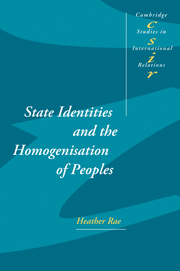Book contents
- Frontmatter
- Contents
- Preface
- Introduction
- 1 State formation and pathological homogenisation
- 2 The ‘other’ within Christian Europe: state-building in early modern Spain
- 3 State-building in early modern France: Louis XIV and the Huguenots
- 4 Pathological homogenisation and Turkish state-building: the Armenian genocide of 1915–1916
- 5 ‘Ethnic cleansing’ and the breakup of Yugoslavia
- 6 Evolving international norms
- 7 On the threshold: the Czech Republic and Macedonia
- Conclusion
- Bibliography
- Index
- CAMBRIDGE STUDIES IN INTERNATIONAL RELATIONS
2 - The ‘other’ within Christian Europe: state-building in early modern Spain
Published online by Cambridge University Press: 22 September 2009
- Frontmatter
- Contents
- Preface
- Introduction
- 1 State formation and pathological homogenisation
- 2 The ‘other’ within Christian Europe: state-building in early modern Spain
- 3 State-building in early modern France: Louis XIV and the Huguenots
- 4 Pathological homogenisation and Turkish state-building: the Armenian genocide of 1915–1916
- 5 ‘Ethnic cleansing’ and the breakup of Yugoslavia
- 6 Evolving international norms
- 7 On the threshold: the Czech Republic and Macedonia
- Conclusion
- Bibliography
- Index
- CAMBRIDGE STUDIES IN INTERNATIONAL RELATIONS
Summary
In 1492 the ‘Catholic Monarchs’ Ferdinand and Isabella ordered the Jewish population of Spain to either convert to Christianity or leave the country. This order affected between 1.5 to 2 per cent of the population of Spain at the time and it ushered in a new conception of political life within the nascent state. During the medieval period, as leaders elsewhere in Europe were sporadically expelling Jews, in Spain a period of relative tolerance existed, in which the Christian, Muslim and Jewish communities coexisted, albeit not without tensions. This chapter traces the breakdown of the medieval convivencia, and the rising tide of hostility towards both Jews and Muslims, and towards converts from these religions, known respectively as conversos and Moriscos. This hostility culminated in the reign of Ferdinand and Isabella with the establishment of the Spanish Inquisition in 1480 and the expulsion of the Jews in 1492. These events are the main focus of this chapter, as it was during this period that Ferdinand and Isabella laid the foundations of the modern Spanish state. Pathological homogenisation continued, however, with the expulsion of the Moriscos by Philip III in 1609, and I give a brief account of the cultural and social context in which this occurred.
After a brief introductory account of events in early modern Spain, I highlight the mutually constitutive nature of the construction of the corporate and social aspects of state identity that was taking place at this time.
- Type
- Chapter
- Information
- State Identities and the Homogenisation of Peoples , pp. 55 - 82Publisher: Cambridge University PressPrint publication year: 2002



